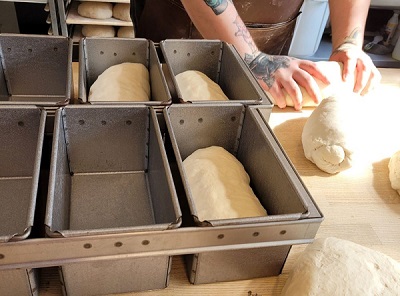Sustaining craft enterprise in food production: A study of bakery businesses
.png)
The research, conducted by Emma Bell, Professor of Organisation and Leadership at the Open University Business School, found that the rising costs of flour and energy pose some serious challenges to bakery owners, and that support is needed for this sector to maintain its important place in local communities.
Professor Bell’s research, which was conducted between May and July this year, aims to explore how small bakery businesses are faring following the pandemic, raise awareness of the innovative work bakery owners are doing, and highlight what could be done to help the sector survive and thrive.
Bakery business was booming
In the past five years, the number of small bakery businesses in the UK has grown, due to increased demand for artisanal bread and a spike in popularity for bread, cakes and pastries. In fact, bakeries adapted swiftly following the first lockdown, with many offering new online ordering and collection systems and, in some cases, adding items to their product ranges.

The report, which was created with support from The Real Bread Campaign and the Craft Bakers Association, shows that small bakery businesses have contributed significantly to British food cultures and local communities, and their growth builds upon a long history of craft baking in the UK.
Professor Bell (pictured right) says “Small bakeries enrich our food culture by using craft skills to make bread in local, traditional and sustainable ways. In recent years, consumer demand for these artisanal products has increased and the number of small bakery businesses has grown.”
Rising costs, customer cutbacks and recruitment issues
However, despite promising signs of growth, there are now major challenges for the sector. The war in Ukraine increased wheat prices by 40% while the soaring cost of living means that many consumers are now cutting back.
Results of a survey, conducted as part of the research, showed that the cost of ingredients was the biggest concern for bakery owners, followed by rising energy costs, followed by cost-of-living pressures on their customers.
The report also found that the recruitment and retention of skilled bakery employees is a further widespread concern amongst these business owners and that, while they are willing to train bakers, there is an issue of an aging workforce and limited training opportunities for young bakers.
Building a sustainable food culture

Professor Bell said, “In the face of soaring costs and a shortage of skilled bakers, we need to find ways to support these innovative small businesses and ensure small bakeries continue to play an important role in building local, sustainable food cultures in the UK.
Chris Young, from the Real Bread Campaign commented, “This report gives an insightful snapshot of the state of micro and other small bakeries in the UK. While the Real Bread movement remains vibrant, the findings highlight the plight that many small businesses face and underline the need for the support that the Real Bread Campaign has urged the government to provide.”
The report states that a successful future for these small businesses will require bakery owners to work together with policy makers, educators, and suppliers to build more resilient supply chains, improve training and career pathways for bakers and enhance customer awareness about the benefits of locally made, fresh bread and bakery products.
